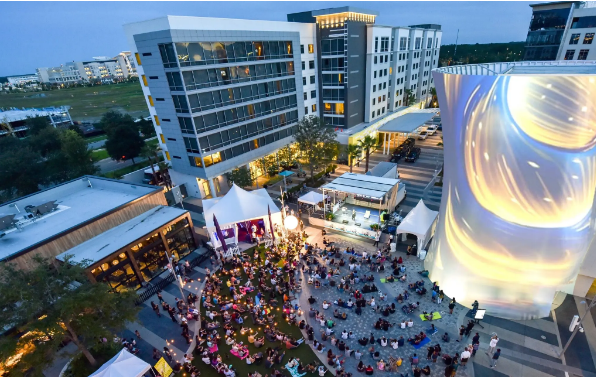A new office complex, and relocation of a division from California, would have created more than 2,000 jobs but was scuttled as the company and Gov. Ron DeSantis continue to feud.
In March, Disney called Gov. Ron DeSantis of Florida “anti-business” for his scorched-earth attempt to tighten oversight of the company’s theme park resort near Orlando. Last month, when Disney sued the governor and his allies for what it called “a targeted campaign of government retaliation,” the company made clear that $17 billion in planned investment in Walt Disney World was on the line.
“Does the state want us to invest more, employ more people, and pay more taxes, or not?” Robert A. Iger, Disney’s chief executive, said on an earnings-related conference call with analysts last week.
On Thursday, Mr. Iger and Josh D’Amaro, Disney’s theme park and consumer products chairman, showed that they were not bluffing, pulling the plug on an office complex that was scheduled for construction in Orlando at a cost of roughly $1 billion. It would have brought more than 2,000 Disney jobs to the region, with $120,000 as the average salary, according to an estimate from the Florida Department of Economic Opportunity.
The project, near Lake Nona Town Center, was supposed to cost $864 million, but recent price estimates have been closer to $1.3 billion. Disney had planned to relocate as many as 2,000 employees from Southern California, including most of a department known as Imagineering, which works with Disney’s movie studios to develop theme park attractions.
Most of the affected employees complained bitterly about having to move — some quit — but Disney held firm, partly because of a Florida tax credit that would have allowed the company to recoup as much as $570 million over 20 years for building and occupying the complex.
The Rift Between DeSantis and Disney
How the Feud Started: The fight between Gov. Ron DeSantis of Florida and Disney started when the company criticized an education law that opponents labeled “Don’t Say Gay.” Here’s what to know about the dispute.
An Escalating Conflict: DeSantis has conducted a long-running campaign to limit the autonomy of Disney World, widely seen as retaliation for Disney’s opposition to the education legislation.
Man vs. Mouse: Republicans are increasingly taking on corporations they denounce as “woke,” but the Florida governor has discovered that going to war with Disney is a dicey business.
When he announced the project in 2021, Mr. D’Amaro cited “Florida’s business-friendly climate” as justification.
Mr. D’Amaro’s tone in an email to employees on Thursday was notably chillier. He cited “changing business conditions” as a reason for canceling the Lake Nona project. “I remain optimistic about the direction of our Walt Disney World business,” Mr. D’Amaro said in the memo. He noted that $17 billion was still earmarked for construction at Disney World over the next decade — growth that would create an estimated 13,000 jobs. “I hope we’re able to,” he said.
The memo, which was viewed by The New York Times, did not mention Mr. DeSantis. But the company’s battle with the governor and his allies in the Florida Legislature figured prominently into Disney’s decision to cancel the Lake Nona project, according to two people briefed on the matter, who spoke on the condition of anonymity to discuss private deliberations. A spokeswoman for Mr. Iger said he was not available for an interview.
Editors’ Picks
Four Bedrooms for $275,000? An Upstate Couple Hoped to Find a Family Home to Grow In.
‘What Can I Not Handle at This Point’: Ariana Madix on That Affair
36 Hours in Buenos Aires
Disney, the door is open to bring those jobs back to California – the state that actually represents the values of your workers. https://t.co/kbCi7Zgs90
— Gavin Newsom (@GavinNewsom) March 13, 2022
A spokesman for Mr. DeSantis said in an email: “Disney announced the possibility of a Lake Nona campus nearly two years ago. Nothing ever came of the project, and the state was unsure whether it would come to fruition. Given the company’s financial straits, falling market cap and declining stock price, it is unsurprising that they would restructure their business operations and cancel unsuccessful ventures.”
Florida officials have repeatedly pointed to the Lake Nona development as an example of economic vibrancy in Orlando, which suffered mightily during the pandemic. Noting that hotel chains and retailers were moving into the Lake Nona area in anticipation of Disney’s arrival, The Orlando Business Journal in January called the complex “a major economic driver for the region.”
In a statement, Jerry L. Demings, the mayor of Orange County, which includes Orlando, said it was “unfortunate” that Disney canceled its plans. “However, these are the consequences when there isn’t an inclusive and collaborative work environment between the state of Florida and the business community,” Mr. Demings said.
Gov. Gavin Newsom of California thanked Disney. “That’s 2,000+ jobs that will be welcomed back with open arms to the Golden State,” Mr. Newsom said on Twitter.
Disney has already incurred millions of dollars in expenses related to the project, including relocation costs for about 200 employees who have already moved to Florida from California. Mr. D’Amaro said in his note that the company would discuss options with those workers, “including the possibility of moving you back.” (It was not clear whether any of the people who quit rather than moved would have the chance to return to their jobs.) The Lake Nona project had initially been scheduled to open next year. Last July, Disney pushed back the move-in date to 2026, citing pandemic-related construction delays.
The Lake Nona campus, about 20 miles from Disney World near the Orlando International Airport, had been championed by Bob Chapek, who served as Disney’s chief executive from 2020 until he was fired last year. Mr. Iger, who came out of retirement to retake Disney’s reins, was much less enthusiastic about the project — even before the company became mired in its battle with Mr. DeSantis. As soon as he returned to Disney, Mr. Iger began telling lieutenants, for instance, that it made little sense to move Imagineering so far away from Disney’s movie studios. As he is fond of saying, “Creative teams need to be together.”
Mr. Iger has been systematically reversing Mr. Chapek’s decisions. In February, for instance, he announced that Disney would restructure its inner workings, ending a framework put in place by Mr. Chapek. In March, as part of wide-ranging layoffs, Mr. Iger shut down a 50-person metaverse project that Mr. Chapek had started.
Disney is also in the midst of cutting $5.5 billion in costs as it seeks to improve profitability, pay down debt and restore its dividend. Later on Thursday, for instance, Disney said it would close an underperforming luxury hotel at Disney World. The 100-room property, announced in 2017 and opened last year, simulated a two-night trip on a “Star Wars” spaceship. Bookings started at $6,000 for a family of four; the price limited interest. Disney spent hundreds of millions of dollars to build and market the immersive offering, which it called the Galactic Starship.
Disney shares closed at about $94 on Thursday, down about 45 percent from two years ago.
Mr. DeSantis and Disney have been sparring for more than a year over a special tax district that encompasses Disney World. The fight started when the company criticized a Florida education law that opponents labeled “Don’t Say Gay” because it limits classroom instruction about gender identity and sexual orientation — angering Mr. DeSantis, who repeatedly vowed payback.
Since then, Florida legislators, at the urging of Mr. DeSantis, have targeted Disney — the state’s largest taxpayer — with a variety of hostile measures. In February, they ended Disney’s long-held ability to self-govern its 25,000-acre resort as if it were a county by giving Mr. DeSantis control over government services at the resort.
It was soon discovered that the previous, Disney-controlled board had approved development contracts that lock in a growth plan for the resort. An effort to void those agreements has since resulted in dueling lawsuits, with Disney suing Mr. DeSantis and his allies in federal court and the governor’s tax district appointees returning fire in state court.
A correction was made on May 18, 2023: An earlier version of this article referred incorrectly to the Lake Nona project that Disney had planned in Orlando, Fla. The project is near Lake Nona Town Center, not known by that name.




